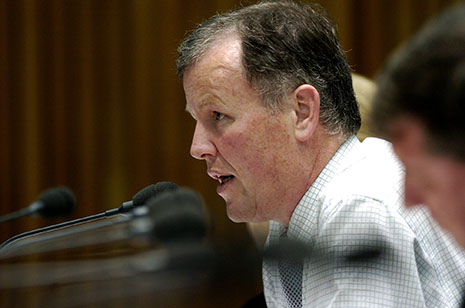AMIDST ALL THE NOISE about the proposed federal human rights law, presently under consideration by Frank Brennan’s committee, there’s been relatively little said about Victoria’s Human Rights Charter. That’s because, for both sides of the debate, it’s been a frustrating sixteen months since the Charter came into operation.
Supporters of human rights laws have had to look on uncomfortably while a line of criminals, suspected criminals and opportunists have raised their Charter rights before Victoria’s courts and tribunals. Charter opponents, who denounce the new law as a massive transfer of political power to unelected judges, must have found those same judges’ tendency to turn down (or dodge) claim after claim quite frustrating. So, hooray for the first likeable human to actually win a rights claim in Victoria.
Gary Kracke hasn’t committed any crimes. He isn’t after anyone’s money or reputation. He isn’t rich or famous. He doesn’t have a political agenda, liberal or conservative, broadsheet or tabloid. Best of all, he has a valid complaint. Since 2005, because he has a mental illness, he’s been forced to endure medical treatment against his will under Victoria’s mental health laws. But the government agency that’s responsible for ensuring compliance with those laws has breached them itself. Not just once, but repeatedly over many years and, indeed, in multiple cases.
The agency at fault, Victoria’s Mental Health Review Board, admits all this. Some readers may wonder what else there is to litigate. But one of the hardest questions in the law is the consequences of breaking it. Kracke says that the board’s mistakes mean that he can’t be forced to endure further treatment (at least until the involuntary treatment process is restarted). The board says that its mistakes don’t matter at all, legally at least. Victoria’s mental health law doesn’t say. And the general law of Australia doesn’t help much either. Enter Victoria’s human rights Charter.
KEVIN BELL, a part-time viticulture student at Charles Sturt University, runs a winery business with his wife on the Mornington Peninsula. In his other job, he was once a lawyer, representing a variety of community legal claimants. The same year that Kracke was first forced to take medicine for his mental illness, Bell was appointed to the bench of Victoria’s Supreme Court.
The balance of Bell’s siblings on the bench have reacted to Charter claims by the like of sex offenders with barely concealed contempt and a bevy of technical objections. Recently, two judges barred an unrepresented litigant, who claimed that he had received threats from Victoria police, from raising human rights arguments on appeal. In any event, they declared, claims of state death threats “are simply not engaged by the Charter.”
Bell, by contrast, raised the human rights law himself on behalf of litigants before him. A notable example was the brothers Mirik, who faced a compensation claim for a hideous and degrading assault. Bell called for submissions on whether or not the Miriks’ human rights were being breached because they had no lawyer. At the next hearing, they had a government-funded lawyer, courtesy of a change of heart by Victoria Legal Aid.
Perhaps unsurprisingly, Bell has since moved away from the Supreme Court to take up the presidency of its much less glamorous counterpart, the Victorian Civil and Administrative Tribunal, or VCAT. A major part of his task is a root-and-branch review of the legal body that Victorians are most likely to deal with. The VCAT presidency also carries the perk of allowing Bell to “call in” the tribunal’s most interesting cases.
Kracke’s human rights complaint is one of several Charter claims presently in Bell’s hands. Such cases have an importance that extends beyond the lives of individual litigants or even their immediate subject matter: mental health or tenancy law or freedom of information and the other stars of VCAT’s low key docket. Instead, given the tepid treatment of the Charter by senior courts to date, they represent an opportunity for Bell to show how to apply the Charter properly.
While the text of human rights laws, actual and proposed, are endlessly debated, the true test of such laws comes from their application. Many laud the plain language of human rights, in comparison to other statutes. But they are really only talking about individual words. “Right” and “privacy” are simple enough, but a “right to privacy” isn’t and “A person has a right not to have his or her privacy arbitrarily or unlawfully interfered with” is fiendish. Bundle fifty such sentences together with no apparent links between them and mix in some feel goodness, party politics and gobbledegook and you have the Charter.
In the hands of judges born or made mean or timid, the Charter can easily be strained into a thin gruel. It’s certainly a lot of work to take such basic ingredients and boil up a rich soup. Bell’s reasons for judgment in Kracke’s case, which considered only a fraction of the Charter, were a thesis-length 75,000 words, or well over ten times the length of the Charter itself.
Much of the judgment was directed to Bell’s own present and past colleagues on the bench. Victoria’s courts and tribunals are exempt from the Human Rights Charter, except when interpreting statutes and in their administrative functions, courtesy of a wholly speculative constitutional concern backed by Victoria’s solicitor-general. Bell’s response was to give the words “interpretation” and “administrative” their widest possible reading, ensuring that much of his own tribunal’s behaviour would be governed by the Charter.
And he went further, taking advantage of an embarrassing typo in the Charter’s application clause, which purports to give courts and tribunals other undefined “functions.” Courts must be bound by some of the Charter in all their functions, Bell ruled, lest that clause’s “powerful opening words” be ignored. Those powerful words? “This Charter applies to: …” It’s not exactly “We the People,” is it? So, it’s not surprising that, in the end, words were all that Victoria’s Charter could offer to Kracke.
EVERY DAY SINCE 2005, Gary Kracke has swallowed a tablet of sodium valporate. Every fortnight, he attends a nurse for an intramuscular depot injection of slow-release risperidone. He doesn’t want to take either drug, because they have unpleasant side effects and change his mood and thoughts. But his psychiatrists want him to and, because of his illness, their orders are law.
In 2007, Kracke was listed as AWOL by staff at Victoria’s Mental Health Review Board. Being AWOL would have had enormous consequences, permitting him to be involuntarily detained. In fact, he was still diligently taking his tablet and reporting to the Mid West Area Health Service. It was the board that was AWOL.
The MHRB is the only barrier to stop the good intentions of psychiatrists from paving a road to hell for their patients. Its job is to check the doctors’ orders on a strict timetable. While it rarely disagrees with the doctors – it does so in fewer than one in twenty cases – it’s common for the doctors to change their orders before the hearing. As the board observes in its annual report, a looming review of your work always makes you think again.
Hence, the tragedy that the board was completely unable to perform its review function. In Kracke’s case, his request for an adjournment back in 2006 to seek a second opinion – a common occurrence – caused his compulsory eight-week review to disappear into a two-year administrative black hole. Thousands of other cases similarly slipped behind, well into 2008, until the board (citing the Charter) got its act together.
SINCE 2007, Kracke, like every other Victorian, has had a right not to have medical treatment without his consent. But, when President Bell’s attention turned from the courts to Kracke, his generous reading of the Charter suddenly narrowed. The statute had no legal effect on law before 2008, he ruled. And, anyway, no one was in the wrong so long as Kracke’s rights were being limited “reasonably.” Which they were, Bell found, because his doctors were applying “strict criteria” and reviewing them (themselves of course) periodically.
The apparent reason for Bell’s mid-judgment transformation from grand jurist to Yes Minister bureaucrat is his repeated concern that Kracke’s arguments would cause chaos for the mental health system. Given that so many other cases had slipped past their deadline, that’s quite a problem. But equally worrying is that anything from one in twenty of those cases to many more could have involved orders that ought to have been overturned.
While the government may be displeased at some of Bell’s adventurism in Kracke’s case, they’ll be well satisfied with his willingness to factor in the interests of the state – which caused the problem through shoddy legislation and administration, and would otherwise have had to pay in hurried new laws, more resources and some hefty political capital – when determining the rights of individuals like Kracke.
Bell did find, though, that one of Kracke’s rights was unreasonably breached. That was his right to a fair hearing, which included a right to a timely hearing. The government, which has opposed each and every Charter claim to date, argued that only court litigants had a right to a fair hearing. But Bell refused to treat Kracke’s compulsory medical treatment order as if it was a fishing licence. And he also rejected another argument that would have required Kracke to go to the Supreme Court to get a remedy.
On the other hand, his earlier rulings meant that the only available remedy was a pyrrhic one. And that’s why Kracke is now the first Victorian to be given a piece of paper that records the solemn fact that his human rights have been breached. As he takes his medicine and struggles to hold onto his personality, he is surely one of the last Victorians to need such a reminder. •




